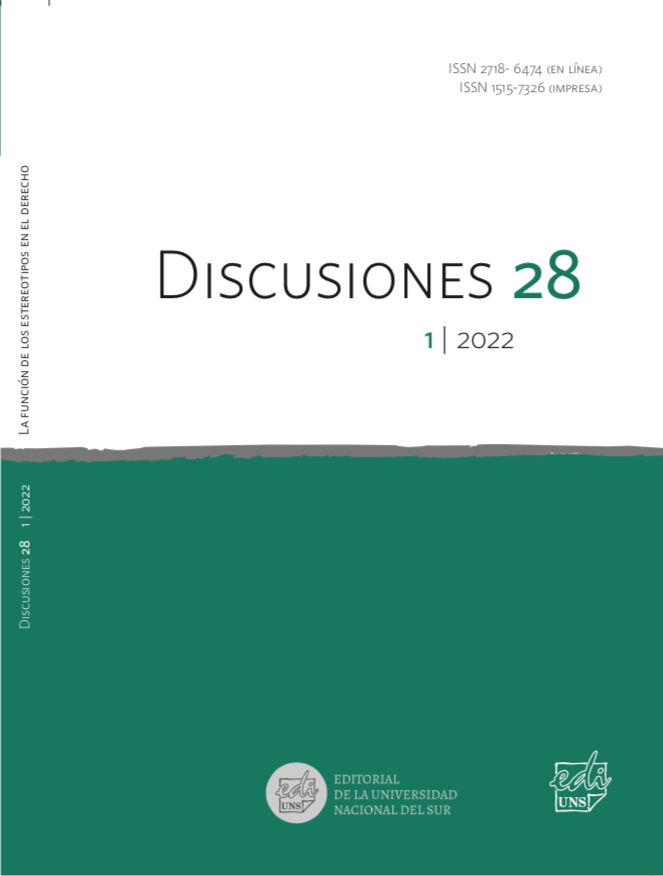Dominic Ongwen en la Corte Penal Internacional: un análisis feminista sobre crímenes internacionales y subjetividades complejas en la guerra
DOI:
https://doi.org/10.52292/j.dsc.2022.3338Palabras clave:
Dominic Ongwen, teoría feminista, crímenes internacionales, justicia internacional, atrocidadesResumen
En febrero de 2021, la Corte Penal Internacional condenó a Dominic Ongwen, antiguo niño soldado y posterior comandante del Ejército de Resistencia del Señor (LRA), por 61 cargos de conductas constitutivas de crímenes de lesa humanidad y de guerra, cometidas entre 2002 y 2005 en el Norte de Uganda. En este artículo reflexiono sobre los crímenes que la Corte le atribuyó y sobre su condición de víctima-victimario. Me ocupo principalmente de escrutar los dichos y los silencios de la sentencia desde una perspectiva de género y feminista. Defenderé la tesis de que el caso abre una veta de reflexión sobre las paradojas de la pulsión punitiva de la lucha feminista internacional y sobre la dificultad para superar binarios radicales en el derecho penal internacional.
Descargas
Citas
Allain, J. (2021). Amicus Curiae Observations on the issue of Sexual and Gender-based Crimes: Sexual Slavery & Forced Marriage. La Haya: Corte Penal Internacional.
Ardila, M., Ibáñez, M. C., Fernández-Paredes, T., Kravetz, D., SáCouto, S. y
Seoane, D. (2021). Amici Curiae Observations on Sexual- and GenderBased Crimes, Particularly Forced Pregnancy, and on Standards of Proof Required for Sexual and Reproductive Violence Pursuant to Rule 103 of the Rules of Procedure and Evidence. La Haya: Corte Penal Internacional.
Armitage, C. (2015). The residuals of colonial rule and its impact on the process of racialisation in Uganda. CERS Working Paper, 1-11. Obtenido de: https://cers.leeds.ac.uk/wp-content/uploads/sites/97/2016/04/ The-residuals-of-colonial-rule-and-its-impact-on-the-process-ofracialisation-in-Uganda-Colette-Armitage.pdf
Ashraph, S., Barbour, S., Campbell, K., Kather, A. L., Kestenbaum, J. G., Marcus, M., Yang, H. (2021). Observations on Sexual- and Gender-Based Crimes, Particularly Sexual Slavery, and on Cumulative Convictions Pursuant to Rule 103 of the Rules of Procedure and Evidence. La Haya: Corte Penal Internacional.
Baines, E. K. (2009). Complex political perpetrators: reflections on Dominic Ongwen. The Journal of Modern African Studies, 47(2), 163-191.
Baines, E. K. (2014). Forced Marriage as a Political Project: Sexual Rules and Relations in the Lord’s Resistance Army. Journal of Peace Research, 51(3), 405-17.
Baines, E., Brouwer, A.-M. d., Bunting, A., Volder, E. d., Maloney, K. M., O’Brien, M., . . . Rosenthal, I. (2021). Amici Curiae Brief on Forced Marriage. La Haya: Corte Penal Internacional.
Cohen, D. K., Green, A. H., & Wood, &. E. (2013). Wartime Sexual Violence: Misconceptions, Implications, and Ways Forward. Special Report, United States Institute of Peace. Obtenido de: https://www.usip.org/sites/default/files/wartime%20sexual%20violence.pdf
D. Villamil, M. D. (2020). Los órdenes del prejuicio: los crímenes cometidos sistemáticamente contra personas LGBT en el conflicto armado colombiano. Bogotá: Colombia Diversa.
Darden, J. T., Henshaw, A., & Szekely, O. (2019). Insurgent Women: Female Combatants in Civil Wars. Washington D.C: Georgetown University Press.
Dolan, C., Fletcher, L. E., & Oola, S. (2013). Promoting accountability for conflict-related sexual violence against men: a comparative legal analysis of international and domestic laws relating to IDPs and refugee men in Uganda. Kampala & Berkeley: Refugee Law Project & Berkeley Law School.
Engle, K. (2020). The Grip of Sexual Violence in Conflict: Feminist Interventions in International Law. Stanford, California: Stanford University Press.
Facio, A (2000). Hacia otra teoría Crítica del Derecho. En Herrera, G. (coord.). Las fisuras del patriarcado, reflexiones sobre feminismo y derecho (pp. 15-45). Quito: FLACSO-Ecuador –CONAMU.
Gowrinathan, N. (2021). Radicalizing Her: Why women choose violence? New York: Beacon Press.
Grey, D. R., Center, G. J., Justice, W. I., y International, A. (2021). Amici Curiae Observations on the Rome Statute’s definition of ‘forced pregnancy’ by Dr Rosemary Grey, Global Justice Center, Women’s Initiatives for Gender Justice and Amnesty International. La Haya: Corte Penal Internacional.
Halley, J. (2008). Rape at Rome: Feminist Interventions in the Criminalization of Sex-Related Violence in Positive International Criminal Law. Michigan Journal of International Law, 30(1), 1-123.
Lomo, Z., y Hovil, L. (2004). Behind the violence: Causes, Consequences and the Search for Solutions to the War in Northern Uganda. Kampala: Refugee Law Project. Obtenido de: https://refugeelawproject.org/files/ working_papers/RLP.WP11.pdf
Lomo, Z. y Hovil, L. (2004). Behind the Violence: The War in Northern Uganda. Kampala: Refugee Law Project. Obtenido de: https://www.files. ethz.ch/isn/118335/99%20FULL.pdf
Loyle, C. E., Dacan, N., Nkayimbi, S., Oroma, A., & Ogora, L. (2021). Justice during the War with the Lord’s Resistance Army in Uganda. Oslo: PRIO.
Lwanga-Luyiigo, S. (1987). The colonial roots of internal conflict in Uganda. International Seminar on Internal Conflict. Kampala: Makerere University Institute of Social Research & International Alert, 1-37.
MacKinnon, C. (1983). Feminism, Marxism, Method, and the State: Toward a Feminist Jurisprudence. Signs: Journal of Women, Culture and Society, 8(4), 635-658.
Nesiah, Vasuki (2018). Gender and Forms of Conflict: The Moral Hazards of Dating the Security Council. En Aoláin, F. N., Naomi Cahn, Haynes, D. F. and Valji, N. (eds.). The Oxford Handbook of Gender and Conflict (pp. 288-301). Oxford: Oxford University Press. DOI: 10.1093/ oxfordhb/9780199300983.013.23
Sander, B. (2016). We Need to Talk About Ongwen: The Plight of VictimPerpetrators at the ICC. Justice in Conflict. Obtenido de: https:// justiceinconflict.org/2016/04/19/we-need-to-talk-about-ongwen-theplight-of-victim-perpetrators-at-the-icc/
Sliedregt, E. V. (2021). The ICC Ntaganda Appeals Judgment: The End of Indirect Co-perpetration? Just Security. Obtenido de: https://www. justsecurity.org/76136/the-icc-ntaganda-appeals-judgment-the-endof-indirect-co-perpetration/
Steflja, I., & Darden, J. T. (2020). Women as War Criminals: Gender, Agency, and Justice. Stanford: Stanford University Press.
Téllez, A. M. (2018). Mujeres excombatientes y transformación de conflictos: paradojas de la construcción de la paz en la lucha armada. La Manzana de la Discordia, 21-39. DOI: https://doi.org/10.25100/ lamanzanadeladiscordia.v13i2.6730
Tim Allen, J. A. (2020). What Happened to Children Who Returned from the Lord’s Resistance Army in Uganda? Journal of Refugee Studies, 33(4), 663-683.
Whiting, A. (2016). There is Nothing Extraordinary about the Prosecution of Dominic Ongwen. Justice in Conflict. Obtenido de: https:// justiceinconflict.org/2016/04/18/there-is-nothing-extraordinaryabout-the-prosecution-of-dominic-Ongwen/
Publicado
Versiones
- 2024-09-15 (2)
- 2022-07-04 (1)
Cómo citar
Número
Sección
Licencia
Derechos de autor 2022 María Daniela Díaz Villamil

Esta obra está bajo una licencia internacional Creative Commons Atribución-NoComercial 4.0.
Discusiones no retiene los derechos de reproducción o copia (copyright), por lo que los autores podrán disponer de las versiones finales de publicación para difundirlas.


